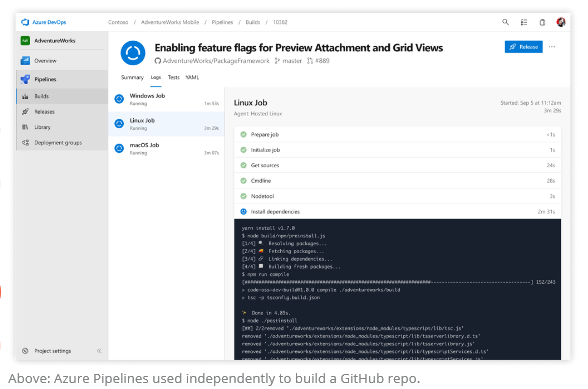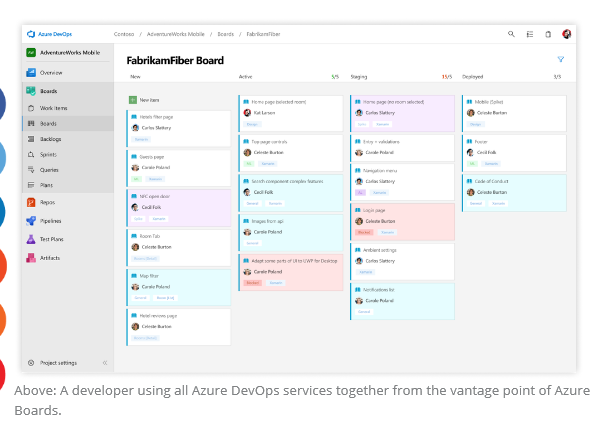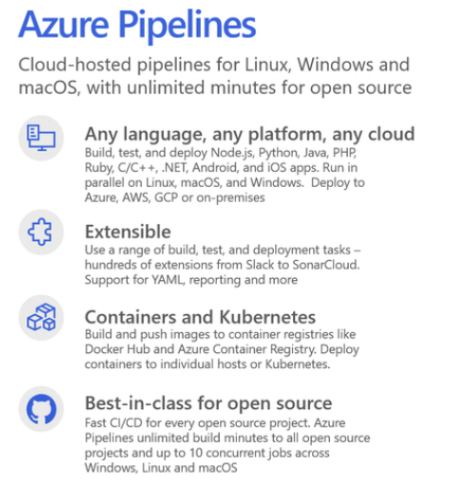+91-8087166655 (24x7) [email protected]
+91-8087166655 (24x7) [email protected]

OPTIMISTIK INFOSYSTEMS | Tuesday, February 12, 2019 | Category: DevOps
On 10th September 2018, Microsoft renamed VSTS (Visual Studio Team Services) to Azure DevOps. It is basically the evolution of VSTS which is the flagship integrated development environment from Microsoft which has enabled developers, architects, and testers to collaboratively develop, design, and test software. To have a stable application environment, it is essential that developers work well with IT operations manpower and vice versa.
DevOps are becoming increasingly critical for the success of teams. It is a strategic move by Microsoft which aims to establish itself as a leader in the market of DevOps. Azure DevOps captures around 15 years of investment in providing tools for supporting teams of software development. One of the most vital goals that DevOps tend to achieve is reliable and faster release of application through Continuous Development (CD) and Continuous Improvement (CI).

Azure DevOps is a collection of integrated services to assist you in planning, building, and shipping software.
There are five services that can assist you with your DevOps efforts:
It is free of cost for small teams for upto 5 users and open source projects. For larger teams, the cost ranges from $30 (10 users) per month to $6,150 (1,000 users) per month. Azure Pipelines offers free CI/CD with 10 parallel jobs and unlimited minutes for every open source project.
Each service of Azure DevOps is extensible and open. They work in a very good way for every type of application regardless of cloud, framework, or platform. It can be used for full DevOps solution or with any other service. As Azure DevOps supports both private and public cloud configurations, it can be run in cloud or in one’s own data center. There is no requirement for purchasing different licenses.

According to Microsoft, millions of VSTS users will upgrade into Azure DevOps project automatically.
VSTS is the evolution of Azure DevOps. The users of VSTS will be upgraded into the projects of Azure DevOps impulsively. There will be no loss of functionally for the existing users; it will simply be about more control and choice. The integration and traceability which is a distinct feature of VSTS is all there. The following changes can be seen by the existing users:
Azure DevOps enables Microsoft in aligning with the change of dynamics in the industry.
1. Get the best out of the Github acquisition
The foundation of DevOps is Source code control management (SCM). It is the aim of Microsoft to maximize its investment through connecting the dots across Azure and Github. Microsoft is working at its best to ensure that operators, developers, and testers get the best experience in taking the source code of Github repositories all the way to the deployment target- Azure compute services delivered through containers and virtual machines.
2. Compete in a better way with AWS
In the recent years, Amazon has built a parallel universe of development tools. AWS Cloud9 IDE, AWS OpsWorks, AWS CodeCommit, AWS Code Pipleline, AWS CodeBuild deliver end-to-end DevOps experience on AWS.Microsoft did not have an integrated DevOps story for Azure. It was a masterstroke when it acquired Github which has put the company in the forefront of DevOps.
3. Going ahead of Visual Studio and Windows
Visual Studio is the cash cow for Microsoft. Microsoft has become successful in taking Office beyond Windows to Mac and the web. It has consciously moved away from positioning Azure as the platform for Windows applications and .NET. Moreover, by rebranding VSTS, Microsoft has made a statement that its toolchain is not only meant for .NET developers.
4. Make Azure useful for open source projects as a preferred cloud
Microsoft has made Azure the best platform for open source projects. Developers can get cloud-hosted pipelines for macOS, Linux, and Windows with 10 free parallel jobs and unlimited minutes for open source projects. It is a big deal for CD/CI project implementation. With VS Code, Azure, Xamarin, Github, and Microsoft has the best toolchains to deploy and develop open source projects.
5. Drive consumption of Azure Compute
Storage and compute are the new currency of vendors of platform. Every vendor of public cloud aligns the offering and services to drive additional consumption of compute, and Microsoft is the same. There are four compute services that are offered by Microsoft like virtual machines (IaaS), containers (CaaS), platforms (PaaS), and functions (FaaS). Azure DevOps lands application deployment artefacts in any of these compute services and directly increases the consumption.
Azure Pipelines
Azure Pipelines is a significant introduction through which you can get cloud-hosted pipelines for Windows, Linux, and MaCOS. You can test, build, and deploy any platform or language to any cloud.

Microsoft uses its customer base to gain access to sell Azure DevOps. And it is not only current TFS and VSTS customers, but any customer who buys the enterprise software. Microsoft has converted their software organizations for using DevOps methods and has lots of technology partners which might provide a leg up in integrations.
OPTIMISTIK INFOSYSTEMS (www.optimistikinfo.com) a preferred name for High Quality Learning Solutions is hosting a 90 minutes webinar on Azure DevOps. This webinar is presented by Mr. Subodh Sohoni , one of the most renowned speaker on the subject. Click Here to know more and to Register.